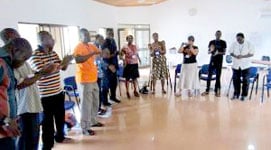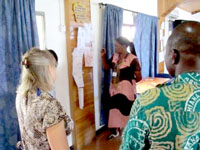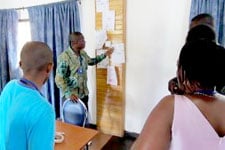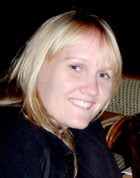(March 23, 2012 - by Ralph Kurtenbach) Adeline McCartney's focus at a British engineering firm was on building bridges, but she's set her sights on work in Africa that will require crossing barriers of language and culture.
|
|
| Adeline McCartney |
She plans to help HCJB Global ministry partners rally communities to work together to construct clean water systems in Sub-Saharan Africa. Fortunately for McCartney, a recent conference in Ghana laid some foundational concepts for such partners.
"The whole workshop took an integrated approach to water, sanitation and hygiene (WASH)," said Sheila Leech, the mission's vice president of international healthcare, one of the 16 participants. "There's only a 20-percent improvement in people's health if clean water alone is provided. If sanitation and hygiene measures are taken into account, that number rises to 85 percent. Therefore, we see how important sanitation and hygiene are."
"We learned through songs, drama and art, and people enthusiastically took part," said Leech of the event organized by a co-worker, engineer Jeremy Maller. The March 5-9 conference held outside of Accra featured instruction by Lifewater International field trainers. "The Bible studies were very well received," Leech added. "One day the participants made a couple of 'jingles' about the use of latrines. It was a lot of fun."
"The Bible studies were very well received," Leech added. "One day the participants made a couple of 'jingles' about the use of latrines. It was a lot of fun."
Eric Wussah of Ghanaian ministry partner Theovision was thrilled with the field trainers' interactive instruction. Afterwards he said that the method "involves everyone. You don't even recognize who the facilitator is … everyone's idea matters." Another Ghanaian, Iddrisu David of Bishara Radio, added that "the participatory method of training is so useful to me as it can be used in my class in school."  Other African attendees came from Believers Broadcasting Network (Sierra Leone), Harvest FM (Lesotho), Radio Evangile Développement (Burkina Faso) and Word FM (Ghana). The event was held during the same month as World Water Day, a U.N.-designated event observed each March 22 since 1993. The day recognizes people's need for clean water.
Other African attendees came from Believers Broadcasting Network (Sierra Leone), Harvest FM (Lesotho), Radio Evangile Développement (Burkina Faso) and Word FM (Ghana). The event was held during the same month as World Water Day, a U.N.-designated event observed each March 22 since 1993. The day recognizes people's need for clean water.
"WASH projects are very important in all of the developing world since waterborne diseases account for huge numbers of deaths daily. Simple education and sanitation methods which cost very little would completely change these figures," Leech said.
In early 2009 the ministry's healthcare outreach launched its first African water project in Hateka, a community outside of Accra. Hateka's first clean water supply was spearheaded by Theovision, which specializes in recording audio Bibles in African languages. Three other communities have since installed wells with Theovision's supervision, fulfilling founder Theo Asare's dream of providing radio stations, medical clinics and clean water wells. Wells have also been dug in Burkina Faso in partnership with RED.
Three other communities have since installed wells with Theovision's supervision, fulfilling founder Theo Asare's dream of providing radio stations, medical clinics and clean water wells. Wells have also been dug in Burkina Faso in partnership with RED.
Leech anticipates community radio stations serving a vital role in promoting further development following clean water projects in African communities. "Community engagement and lifestyle change comes about slowly and often the issue of a biblical worldview needs to be taught," she said. "Transformational development is not a quick process."
The soft-spoken McCartney has already spent a year on water projects in Ecuador where HCJB Global Hands has provided expertise and guidance to communities on clean water projects since 1980. While there, McCartney earned respect from men in rural communities where she confidently directed technical aspects of water projects. After that she returned to her native Northern Ireland to attend a Bible institute in anticipation of full-time missionary service.
Source: HCJB Global

